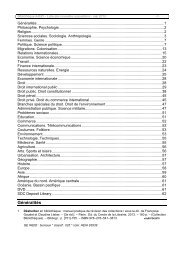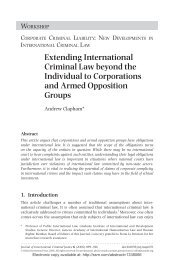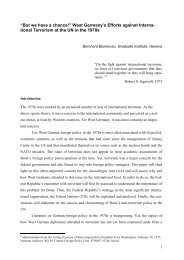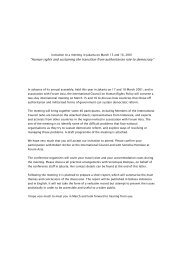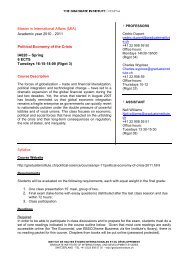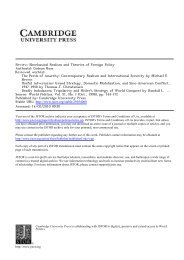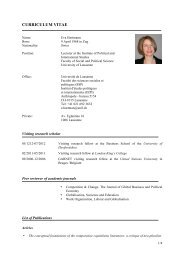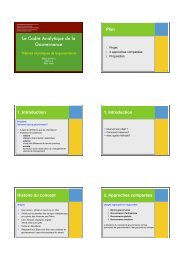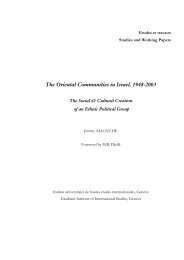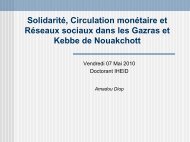Download [pdf] - The Graduate Institute, Geneva
Download [pdf] - The Graduate Institute, Geneva
Download [pdf] - The Graduate Institute, Geneva
Create successful ePaper yourself
Turn your PDF publications into a flip-book with our unique Google optimized e-Paper software.
INFORMAL INTERNATIONAL<br />
LAWMAKING<br />
Edited by Joost Pauwelyn, Ramses Wessel, and Jan Wouters<br />
This book critically assesses the concept of informal international lawmaking, its legal nature, and<br />
impact at the national and international level. It examines whether it is on the rise, as is often claimed,<br />
and if so, what the implications of this are. It addresses what actors are involved in its creation, the<br />
processes utilised, and the informal output produced.<br />
<strong>The</strong> book frames informal international lawmaking around three axes: output informality (novel types<br />
of norms other than treaties), process informality (norm-making in networks outside international<br />
organisations), and actor informality (the involvement of public agencies and regulators, private<br />
actors, and international organisations). Fundamentally, the book is concerned with whether this<br />
informality causes problems in terms of keeping transnational lawmaking accountable. By empirically<br />
analysing domestic processes of norm elaboration and implementation, the book addresses<br />
the key question of how to benefit from the effectiveness of informal international lawmaking without<br />
jeopardising the accountability necessary in the process of making law.<br />
Oxford: Oxford University Press.<br />
2012. 584 p.<br />
GENRE, CHANGEMENTS AGRAIRES<br />
ET ALIMENTATION<br />
Sous la direction de Christine Verschuur<br />
Près d’un milliard de personnes ont faim dans le monde et, paradoxalement, 70 % d’entre elles font<br />
partie de familles paysannes. Cet ouvrage veut attirer l’attention sur les processus d’appauvrissement<br />
des paysannes et paysans. La contribution des paysannes à la production agricole est maintenant<br />
mieux reconnue, tout comme le sont les contraintes liées à leur accès inégal à la terre, aux<br />
outils, à l’eau, au crédit, au travail et au marché. Mais les études de développement agraire s’intéressent<br />
encore peu aux savoirs et stratégies des paysannes, aux systèmes de production vivrière<br />
et à la place que les paysannes y occupent, aux rapports de pouvoir entre producteurs et productrices<br />
agricoles, au travail des ouvrières agricoles. Le dernier titre de la collection « Cahiers Genre<br />
et Développement » vient ainsi combler un manque en abordant plusieurs champs de réflexion : les<br />
silences dans l’économie politique des changements agraires ; la libéralisation agricole et les questions<br />
que pose l’articulation du travail reproductif et productif ; les rapports de pouvoir dans les<br />
systèmes de production vivrière, ainsi que les transformations du travail en milieu rural ; la question<br />
de l’accès à la terre ; les luttes et les enjeux liés au droit à l’alimentation. Cet éclairage nouveau sur<br />
les inégalités de genre dans le développement rural permet de mieux comprendre l’appauvrissement<br />
des familles paysannes.<br />
Cahiers Genre et Développement<br />
8. Paris : L’Harmattan. 2012.<br />
480 p.<br />
LA REVUE DE L’INSTITUT I THE GRADUATE INSTITUTE REVIEW I GLOBE I N11 Printemps I Spring 2013<br />
37


![Download [pdf] - The Graduate Institute, Geneva](https://img.yumpu.com/23370020/38/500x640/download-pdf-the-graduate-institute-geneva.jpg)
